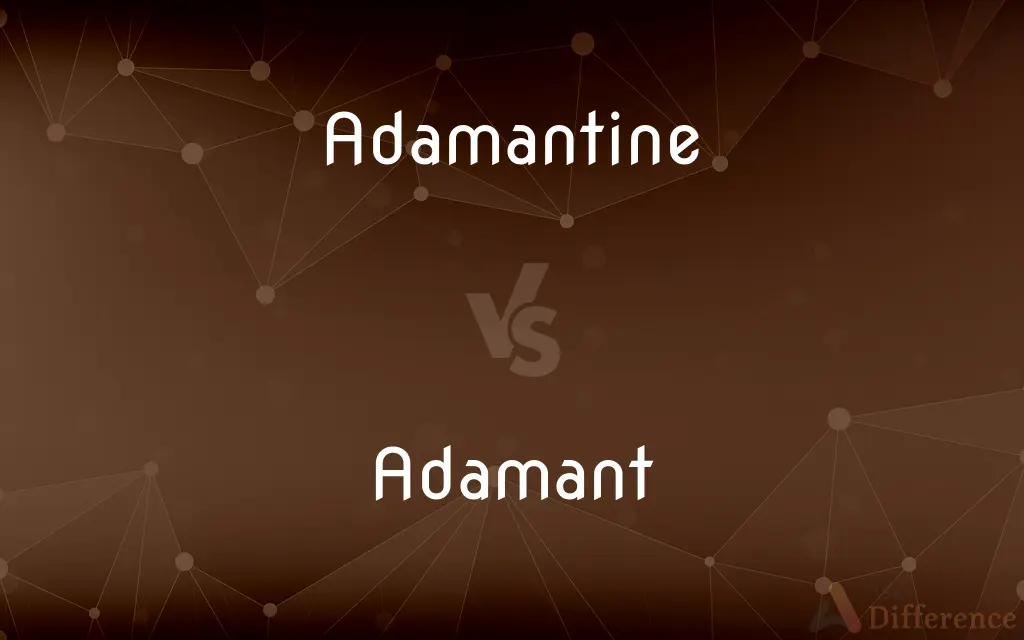Adamantine vs. Adamant — What's the Difference?
Edited by Tayyaba Rehman — By Urooj Arif — Updated on April 4, 2024
Adamantine refers to something incredibly hard or unbreakable, often used metaphorically, whereas adamant describes a person's unwavering or inflexible stance.

Difference Between Adamantine and Adamant
Table of Contents
ADVERTISEMENT
Key Differences
Adamantine and adamant, while closely related in etymology and meaning, diverge in their typical usage and connotations. Adamantine derives from the Greek 'adamantinos', meaning untameable or unbreakable, and historically refers to a legendary, invincible material. It is often used metaphorically to describe substances or surfaces with extreme hardness and durability, akin to diamond. On the other hand, adamant, stemming from the same Greek root, predominantly describes a person's unyielding attitude or firm stance on an issue. This term emphasizes inflexibility and determination, rather than the physical properties of hardness or resilience.
The usage of adamantine is common in literary or descriptive contexts to evoke imagery of unparalleled strength and impenetrability. It may be used to describe the hardness of a material or the invulnerable nature of something, often imbuing the subject with a sense of mythic or heroic quality. Adamant, however, is more frequently applied in discussions about beliefs, decisions, or personalities, characterizing a person who is steadfast, refuses to be persuaded, and stands firm against opposition.
While adamantine conveys a sense of imperviousness to physical forces, adamant is about resistance to metaphorical pressure, such as persuasion or change. Adamantine might describe the impenetrable nature of a fortress or the durability of a material, suggesting something that cannot be easily damaged or broken. Adamant captures the essence of human resolve, portraying an individual's commitment to their convictions or decisions, regardless of the challenges they face.
In terms of their literary and rhetorical impact, adamantine often adds a layer of grandeur or exaggeration, enhancing the described object's perceived strength or value. Adamant, by focusing on the human element, evokes respect for personal integrity and moral fortitude, highlighting the admirable quality of steadfastness in character.
Despite their nuanced differences, both terms speak to the concept of being unassailable, whether it is in the realm of physical materials or the domain of personal convictions. They enrich language by providing powerful means to express the ideas of indomitability and resoluteness, each in its own context.
ADVERTISEMENT
Comparison Chart
Definition
Refers to something unbreakably hard or durable.
Describes a person's unwavering or inflexible stance.
Origin
From Greek 'adamantinos', meaning untameable or invincible.
From the same root, emphasizing inflexibility and determination.
Usage
Often used to describe extreme hardness and durability.
Used to characterize unyielding attitudes or firm stances.
Context
Literary or descriptive, related to physical properties.
Pertains to beliefs, decisions, or personalities.
Connotations
Implies legendary strength and invulnerability.
Focuses on moral or psychological steadfastness.
Compare with Definitions
Adamantine
Often associated with legendary or extraordinary strength.
The artifact, encased in adamantine armor, was deemed invincible.
Adamant
Unyielding in attitude or opinion in spite of all appeals, urgings, or reason.
Despite the evidence, he remained adamant that he was right.
Adamantine
To convey an object's mythic invulnerability or value.
The hero's sword was forged from adamantine, cutting through evil with ease.
Adamant
Focuses on the unwavering nature of convictions.
Even under pressure, the leader's stance was adamantly against the proposal.
Adamantine
Unbreakably hard or strong, resembling or suggestive of a mythical substance.
The vault was secured with adamantine locks that no thief could pick.
Adamant
Strongly committed to a belief or decision.
They were adamant about protecting the environment at all costs.
Adamantine
Describing impenetrable defenses or indomitable will.
Her adamantine resolve was known throughout the lands.
Adamant
Often viewed positively as a sign of integrity and strength.
His adamant defense of justice earned him widespread respect.
Adamantine
Emphasizes physical toughness or durability.
The ancient gates were as adamantine, standing unblemished through centuries.
Adamant
Indicating inflexibility or stubbornness.
Her adamant refusal to compromise surprised everyone.
Adamantine
Unable to be broken
Adamantine chains
Her adamantine will
Adamant
Adamant in classical mythology is an archaic form of diamond. In fact, the English word diamond is ultimately derived from adamas, via Late Latin diamas and Old French diamant.
Adamantine
Made of or resembling adamant.
Adamant
Refusing to be persuaded or to change one's mind
He is adamant that he is not going to resign
Adamantine
Having the hardness or luster of a diamond.
Adamant
A legendary rock or mineral to which many properties were attributed, formerly associated with diamond or lodestone.
Adamantine
Unyielding; inflexible
"If there is one dominant trait that emerges from this account, it is adamantine willpower" (Eugene Linden).
Adamant
Not willing to change one's opinion, purpose, or principles; unyielding.
Adamantine
Made of adamant, or having the qualities of adamant; incapable of being broken, dissolved, or penetrated.
Adamantine bonds
Adamantine chains
Adamant
A stone once believed to be impenetrable in its hardness.
Adamantine
Like the diamond in hardness or luster.
Adamant
An extremely hard substance.
Adamantine
Synonym of adamantium
Adamant
(said of people and their conviction) Firm; unshakeable; unyielding; determined.
Adamantine
Made of adamant, or having the qualities of adamant; incapable of being broken, dissolved, or penetrated; as, adamantine bonds or chains.
Adamant
(of an object) Very difficult to break, pierce, or cut.
Adamantine
Like the diamond in hardness or luster.
Adamant
An imaginary rock or mineral of impenetrable hardness; a name given to the diamond and other substances of extreme hardness.
Adamantine
Consisting of or having the hardness of adamant
Adamant
An embodiment of impregnable hardness.
Adamantine
Having the hardness of a diamond
Adamant
(obsolete) A lodestone.
Adamantine
Not capable of being swayed or diverted from a course; unsusceptible to persuasion;
He is adamant in his refusal to change his mind
Cynthia was inexorable; she would have none of him
An intransigent conservative opposed to every liberal tendancy
Adamant
A stone imagined by some to be of impenetrable hardness; a name given to the diamond and other substances of extreme hardness; but in modern mineralogy it has no technical signification. It is now a rhetorical or poetical name for the embodiment of impenetrable hardness.
Opposed the rocky orbOf tenfold adamant, his ample shield.
Adamant
Lodestone; magnet.
As true to thee as steel to adamant.
Adamant
Very hard native crystalline carbon valued as a gem
Adamant
Not capable of being swayed or diverted from a course; unsusceptible to persuasion;
He is adamant in his refusal to change his mind
Cynthia was inexorable; she would have none of him
An intransigent conservative opposed to every liberal tendancy
Common Curiosities
Can an object be described as adamant?
Typically, adamant is used to describe attitudes rather than physical objects, focusing on the concept of inflexibility or stubbornness.
Is adamantine a real material?
While historically believed to be a mythical or legendary material of extreme durability, adamantine is not recognized as a real material in modern science.
How do these terms contribute to language?
They enrich language by offering nuanced ways to express concepts of strength, whether it be of materials or of character.
What is the origin of these terms?
Both originate from the Greek 'adamantinos', relating to the legendary qualities of hardness and invincibility.
How is adamant used?
Adamant is used to describe a person's firm, unwavering stance on an issue, highlighting their inflexibility or determination.
Why might someone be described as having an adamantine will?
This metaphorical use combines the concepts of unbreakable strength (adamantine) and firm resolve (adamant), emphasizing exceptional determination and resilience.
What does adamantine mean?
Adamantine refers to something extremely hard or durable, often used to describe materials or qualities that are virtually indestructible.
Can a belief system be described as adamantine?
Metaphorically, yes, to imply it is strongly established and virtually impervious to change, though adamant is more commonly used in such contexts.
Are the terms interchangeable?
Though related in origin and theme, they are not interchangeable due to their distinct contexts—adamantine for physical properties and adamant for personal stances.
How is adamantine used in literature?
Often to attribute a sense of mythic strength, invulnerability, or significant value to objects or entities, enhancing their descriptive quality.
Share Your Discovery

Previous Comparison
Hematologist vs. Cardiologist
Next Comparison
Brothership vs. BrotherhoodAuthor Spotlight
Written by
Urooj ArifUrooj is a skilled content writer at Ask Difference, known for her exceptional ability to simplify complex topics into engaging and informative content. With a passion for research and a flair for clear, concise writing, she consistently delivers articles that resonate with our diverse audience.
Edited by
Tayyaba RehmanTayyaba Rehman is a distinguished writer, currently serving as a primary contributor to askdifference.com. As a researcher in semantics and etymology, Tayyaba's passion for the complexity of languages and their distinctions has found a perfect home on the platform. Tayyaba delves into the intricacies of language, distinguishing between commonly confused words and phrases, thereby providing clarity for readers worldwide.














































